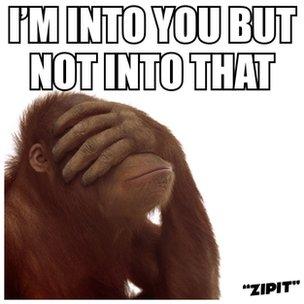Teenagers' anti-sexting app launched
- Published

Users can pick from a variety of messages to reply
A charity has launched a mobile phone app to help teenagers refuse requests for explicit images of themselves.
The free app from Childline offers users a choice of what the charity says are "witty responses" to send instead.
"Sexting" - the sending of intimate images or videos by mobile phone or online - has become so common "it is considered mundane", the charity says.
About six out of 10 of those aged from 12 to 15 are thought to own a smartphone.
In a recent NSPCC/ChildLine survey, six out of 10 teenagers said they had been asked for sexual images of themselves.
The survey - of 450 people - was self-selecting, but the charity said it reflected the results of other studies.
The new app - called Zipit, external - also offers advice on safe online chatting and on what young people should do if they feel threatened or if an image becomes public.
'Almost suicidal'
One 17-year-old boy told Childline sexting was "pretty normal" among his friends.
"My friends and I talk very openly about our experiences within our relationships, and the sort of things we've sent each other. It seems like everyone's doing it."
He said he sometimes got bad reactions to things he sent - but it did not bother him enough to stop.
"Someone saw a video message I had sent to a previous girlfriend, took a screen shot and posted it online. They called me a pervert and lots of people I knew saw it.
"I was completely devastated and, to be honest, almost suicidal."
Peter Liver, from ChildLine, said: "We hope Zipit will give [young people] the tools to defuse the pressure to send, share or collect these images."
The charity has also teamed up with the Internet Watch Foundation (IWF), external to help young people get explicit images of themselves removed from the internet.
- Published16 May 2012